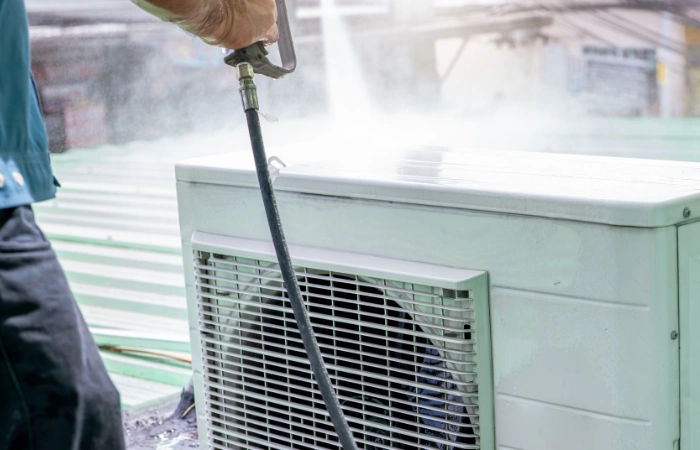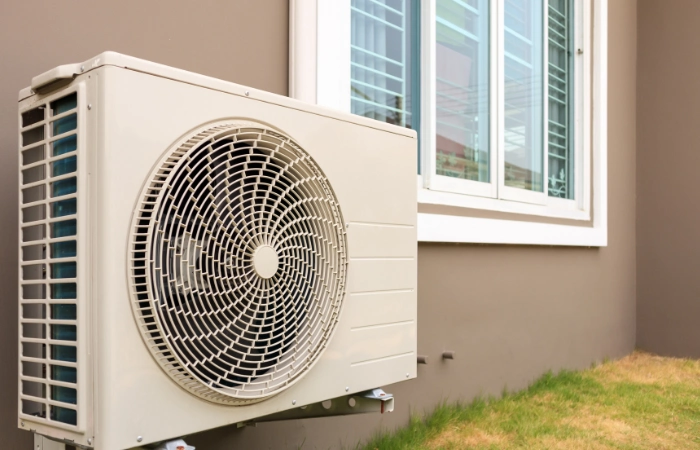Maintaining your air conditioning system is vital, especially when it comes to preventing issues like a clogged drain line. A clogged AC unit drain can lead to a host of problems, from water damage in your home to decreased AC efficiency and poor indoor air quality. Understanding the hvac inspection cost can help you budget for regular checks that prevent issues like clogged AC drains before they start.
In this guide, we’ll explore the signs of a clogged drain, how to fix it yourself, and when it’s best to call a professional. Let’s dive into how you can keep your AC running efficiently by tackling the AC unit drain clogged issue head-on.
How to Know If Your AC Unit Drain Line Is Clogged
There are several signs that can indicate your AC unit’s drain line might be clogged. Recognizing these indications early can help prevent more serious issues, like water damage or reduced efficiency in your AC system. Be aware of the signs of clogged ac drain line to catch and resolve this problem before it leads to more serious damage. Here’s a concise list:
- Water leakage around the AC unit.
- Unusual sounds, such as gurgling, coming from the unit.
- Mold or musty smells near the AC unit.
- Visible growth of mold around drain openings.
- Water overflows in the drain pan.
- The AC system stops functioning or performs poorly.
How to Fix a Clogged AC Unit Drain Line
Fixing an AC unit drain clogged line is essential for maintaining your system’s efficiency and preventing water damage in your home. Clogs can occur due to dust, dirt, and biological growth within the line. Fortunately, with a few tools and some simple steps, you can clear the clog yourself. If you’re facing this common issue, following these steps on how to fix clogged ac drain line can get your system running smoothly again without professional help. Here’s how you can address this common issue in seven detailed steps.
Step 1: Power Off the System
Before you begin any work on your air conditioning system, safety is paramount. Start by turning your thermostat to the “off” position. Next, locate the circuit breaker for your AC unit and switch it off as well. This step ensures that there is no electrical power flowing to the unit while you are working, eliminating the risk of electrical shock and preventing the unit from inadvertently turning on during the process.
Step 2: Locate the AC Drain Line
Identify the AC drain line, which is usually a PVC pipe running from the indoor air handler to the outside of your house. This line helps remove the condensation produced by your AC during its operation. Locating the drain line is crucial as you will be working directly on it to remove the clog. Look for a pipe that exits near the AC unit and typically leads to a drainage area outside. It may have a cap or could be open-ended, depending on the setup of your system.
Step 3: Inspect and Access the Drain Line
Set on a pair of rubber gloves and remove the PVC cap from the drain line, usually located near the indoor cooling unit. This access point is where you will check for visible blockages. If you can see the clog, use your fingers or a small tool to remove as much of the debris as possible. If the clog is not easily reachable or visible, you will need to use other methods in the following steps to dislodge and remove the blockage effectively.
Step 4: Vacuum the Drain Line
Link the hose of a wet/dry vacuum to the end of the AC drain outside your home. Use duct tape to seal the tie between the vacuum hose and the line to ensure no air escapes. Turn on the vacuum and let it run for about one to two minutes. This powerful suction can help remove any clogs that are lodged within the drain line. After vacuuming, check the vacuum canister for signs of debris causing the clog.
Step 5: Flush the Line with Vinegar
After mechanically removing the clog, it’s advisable to treat the line with white vinegar. Pour a quarter portion of white vinegar into the drain line via the access point you opened earlier. Vinegar is a mild acid that helps break down any remaining organic material and prevents the future growth of mold and algae. Allow the vinegar to sit in the line for at least 30 minutes. This natural cleaning agent is safe for your pipes and effective in maintaining clear lines.
Step 6: Rinse the Drain Line
After allowing the vinegar to work, flush the drain line with water to ensure all debris and cleaning solutions are thoroughly washed away. Use a funnel to pour water into the drain line at the indoor access point. It’s helpful to have someone watch the exit of the drain line outside to confirm that water is flowing freely. If the water backs up or flows sluggishly, there may still be a partial blockage.
Step 7: Restart Your AC System
Once you are satisfied that the drain line is clear and water flows freely, replace any caps or covers you removed during the process. Turn the power back on at the breaker and the thermostat. Set your AC to cool and monitor the system for a few minutes to ensure everything is working correctly. Listen for unusual noises and watch the drain line to ensure water is exiting as expected. If issues persist, consider consulting a professional.
Do I Need to Call a Professional to Unclog My AC Drain Line?
Yes, it is advisable to call a professional to unclog your AC drain line. Over time, this line can become blocked with dirt, debris, or mold, which can lead to water leaks and other serious issues like water damage or system failure. A professional technician has the appropriate tools and expertise to safely clear the blockage, ensuring that your system operates efficiently and prevents future problems. They can also check for underlying issues that might be contributing to the blockage, providing a more comprehensive solution.
FAQs on AC Unit Drain Clogged

What are the long-term effects of an untreated AC unit drain clogged?
Leaving an AC unit drain clogged can cause long-term damage, including increased humidity inside your home, reduced efficiency of the AC system, and potential water damage to walls, ceilings, and floors. Regular maintenance and quick responses to clogs help prolong the life of your AC unit and ensure it runs efficiently.
Can a clogged AC unit drain affect indoor air quality?
Yes, a clogged AC unit drain can significantly impact indoor air quality. When the drain is blocked, mold and mildew grow within the system, which may spread spores throughout your home. Keeping the drain line clear helps maintain healthier indoor air and prevents allergen accumulation.
What should I do if my AC unit drain clogged situation recurs frequently?
If your AC unit drain gets clogged frequently, it might indicate an underlying issue with your system, such as incorrect installation or a need for more substantial cleaning. Consulting a professional HVAC technician can help address recurrent clogs by diagnosing and resolving deeper problems, ensuring your unit operates effectively and efficiently.
What other maintenance should I perform on my AC unit besides cleaning the drain line?
Besides cleaning the drain line, regular AC maintenance should comprise replacing or cleaning air filters every 1-3 months, checking refrigerant levels, inspecting electrical connections and controls, cleaning coils and the unit’s exterior, and ensuring the thermostat is functioning properly. This comprehensive approach helps maintain the optimal performance and longevity of your system.
Conclusion
It is clear that an AC unit drain clogged can cause significant issues for your air conditioning system, from reduced efficiency to water damage and poor indoor air quality. To maintain optimal performance of your ac and fan, regular checks and cleaning are essential, especially of critical parts like the drain line. Regular maintenance and prompt action, when problems arise, are key to ensuring your AC unit functions effectively.
If you’re facing recurring issues or need professional assistance, Tropic Air-Conditioning Inc. is here to help. Our skilled technicians provide top-notch AC maintenance and repair services to keep your system in excellent condition. Consider our ac maintenance contracts to ensure your system is inspected and cleaned regularly, helping you avoid issues like clogged drains. Call us today for expert solutions and peace of mind.




